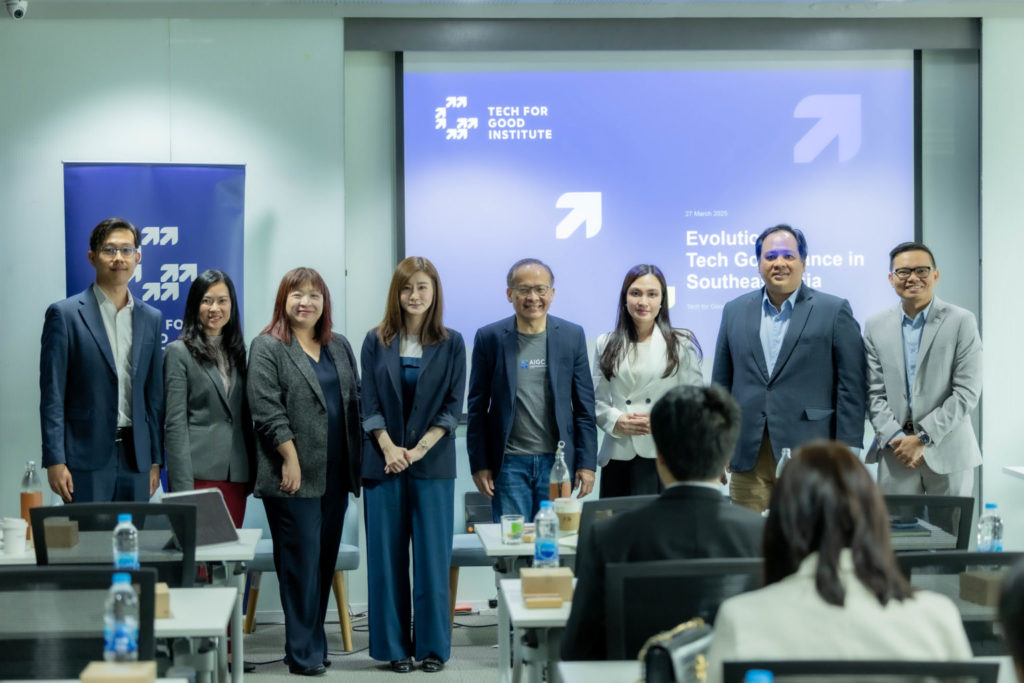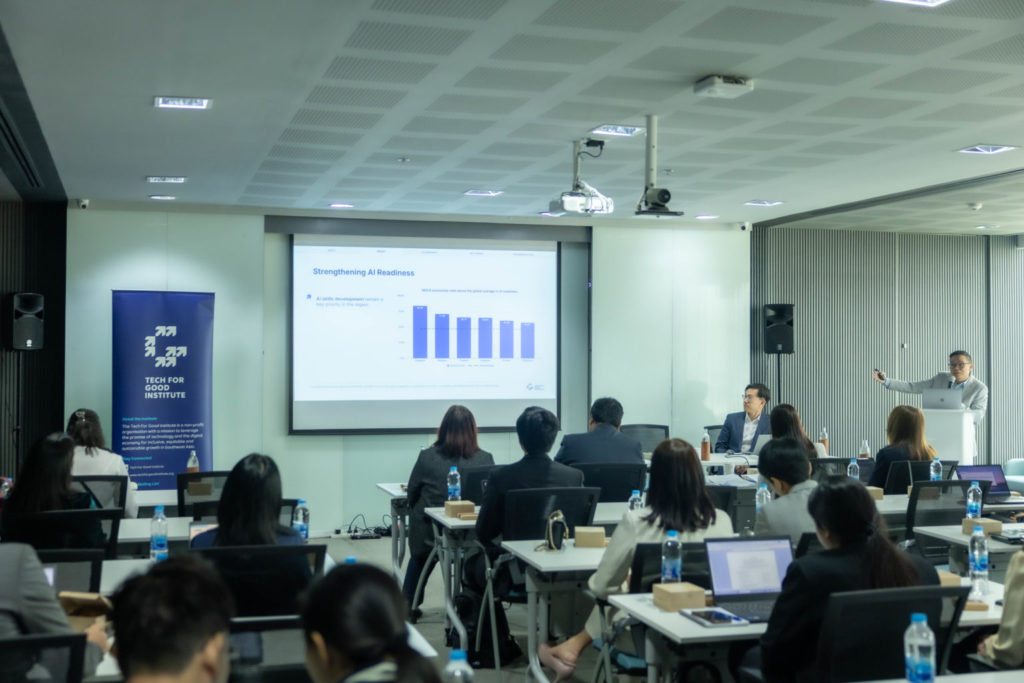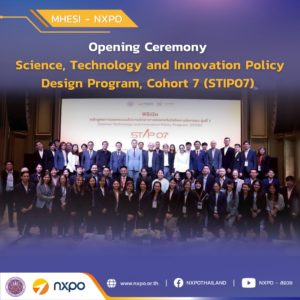by Office of National Higher Education Science Research and Innovation Policy Council (NXPO) and the Tech for Good Institute (TFGI)

Bangkok, 27 March 2025 – Policymakers, industry leaders, and academic experts convened today at the Office of National Higher Education Science Research and Innovation Policy Council for an insightful research dialogue on “Tech Governance in Thailand: Forward-Looking Policies for Sustainable Growth.” The session, organised by NXPO and the Tech for Good Institute, explored key trends and developments in the evolving regulatory landscape of Southeast Asia, with a particular focus on Thailand’s recent policy advancements.
The event also marked the launch of the 2nd Edition of the TFGI’s report, The Evolution of Tech Governance in Southeast Asia-6. The report captures major policy and regulatory developments across the region in 2024, covering Indonesia, Malaysia, Singapore, the Philippines, Thailand, and Vietnam.

“Governments all over the world are seeking to keep pace with innovation while enabling a safe, trusted, inclusive and sustainable digital ecosystem. That’s why the early mindset of ‘move fast and break things’ is evolving into ‘move faster, but fix things,” says Dr Ming Tan, Founding Executive Director of the Tech for Good Institute in a message. “As each country approaches this challenge differently, Tech for Good Institute is delighted to work with NXPO to bring both a regional and national view to tech governance trends in the last year.”

Promoting the Digital Economy, while Protecting the Digital Society
This mindset of adopting a careful approach is evident in the discussion, which centred around two key themes: the promotion of the digital economy and the protection of the digital society. In Thailand, for example, the promotion of the digital economy focuses on maximising the economic potential of digital technologies such as artificial intelligence (AI) and the platform economy. In terms of AI, one key initiative to highlight is Thailand’s vision to be recognised as a leader in AI innovation and ethics. The country is set to host the first Asia-Pacific UNESCO Global Forum on the Ethics of AI in June 2025, further reinforcing Thailand’s commitment to responsible AI development.
To mitigate the risks, the protection of the digital society is also a key priority for Thailand, achieved by creating a regulatory environment grounded in inclusion, trust, and sustainability. The establishment of the Cybercrime Case Division within the Thai Criminal Court, for example, marks a critical step in addressing challenges in the digital domain. Additionally, the Ministry of Higher Education, Science, Research and Innovation (MHESI) launched the “MHESI for AI” initiative, which focuses on talent development through programmes such as “AI University.” The initiative aims to ensure that 90% of graduates have foundational AI knowledge, with the goal of producing 30,000 AI professionals within three years.

“As Thailand’s national policy agency for higher education, science, research, and innovation, NXPO recognises the crucial role of effective governance in fostering sustainable technological growth. Thailand is positioning itself as a hub for innovation and an innovation-driven economy, where emerging technologies like AI, blockchain, and cloud computing are key enablers. Our mission is to craft policies that strike the right balance between enabling innovation and ensuring responsible governance.”, NXPO Assistant to the President Dr. Karantarat Nakwa noted.

Tech Governance in 2025 and Beyond
The evolving landscape of tech governance presents both challenges and opportunities for Thailand. As AI adoption accelerates, digital platforms innovate, and cross-border data flows increase, Thailand must strike a balance between oversight and fostering a thriving digital ecosystem.
Key experts, including Dr Sak Segkhoonthod, Senior Advisor at the Electronic Transactions Development Agency (ETDA), Miss Kasama Kongsmak, Executive Vice President at the Digital Economy Promotion Agency (DEPA), Dr Saliltorn Thongmeensuk from TDRI, and Jirawat Poomsrikaew from the Thai Digital Platform Trade Association, shared their perspectives on what forward-looking policies might look like for 2025. NXPO Policy Specialist Anont Tanaset and TFGI Programme Lead Keith Detros also offered their insights on emerging trends in technology policy and governance approaches across the region.
The speakers noted that while the evolution of tech governance in Thailand will continue, the unique characteristics of the country must be taken into consideration. Emerging issues in AI governance, digital platforms regulations, and cyber resilience will continue to be discussed. In crafting these policies, stakeholders should seek to support the local digital ecosystem, including startups and micro, small, and medium-sized enterprises, while also accounting for the level of literacy and adoption within Thailand’s digital society.
For digital platforms, policies are expected to address issues of fair competition and consumer protection. While competition policies will continue to evolve, it is important to consider how to create a regulatory environment that fosters innovation within the platform ecosystem and enables digital platforms to continue contributing to national development goals. As for consumer protection, the discussion noted that compliance requirements should remain practical for companies to implement. Speakers also emphasised that there is no one-size-fits-all approach to governance. Instead, fit-for-purpose and responsive regulations, tailored to the specific characteristics of Thailand’s digital ecosystem, would be better suited to sustaining the growth of the digital economy and enhancing its competitiveness.
Finally, on a regional level, there is alignment on key priorities such as AI governance, cybersecurity, data protection, and digital safety and trust. The upcoming ASEAN Digital Economy Framework Agreement (DEFA), with negotiations expected to conclude later this year, aims to lay the foundation for greater regional interoperability. While governance structures and regulatory approaches vary across countries, this shared focus creates meaningful opportunities for cross-border collaboration. To bridge differences in policy implementation, regulatory clarity and a gradual, coordinated rollout will be critical. This approach allows for potential policy alignment while also recognising the nuances of each country’s unique governance context.
____
About the Tech for Good Institute
Tech for Good Institute (TFGI) is a non-profit organisation founded in 2021 to encourage conversations and dialogue on how the promise of technology and the digital economy may be leveraged to enable sustainable, equitable and inclusive growth for Southeast Asia.
About the Office of National Higher Education Science Research and Innovation Policy Council (NXPO)
The Office of National Higher Education Science Research and Innovation Policy Council (NXPO) is an autonomous public agency affiliated to the Ministry of Higher Education, Science, Research and Innovation. NXPO serves as the secretariat of the National Higher Education, Science, Research and Innovation Policy Council (Policy Council) and is, therefore, responsible for facilitating the Policy Council in formulating, deploying and monitoring national policy addressing higher education, science, research and innovation under the guidance and instruction of the Policy Council.
For media inquiries, please contact:
- Anont Tanaset
Policy Specialist, NXPO
anont@nxpo.or.th
- Keith Detros
Programme Lead, TFGI
keith.detros@techforgoodinstitute.org







